There are two kinds of history going on in the Cave of the Moonbat tonight: that of an ancient Southwest Asian superpower, and the historiography of historioranting itself. I’ve been doing this pretty-much-weekly history thing for nigh on two years, and with my impending anniversary, I figured now’s as good a time as any to go back into the scrolls and update some of those first History for Kossacks – the ones that didn’t have any pictures (nor, for that matter, many commenters), were less than half as long as a contemporary HfK, and predate even the word I now use to describe the manner in which I seek to tell tales of the human experience.
So join me, if you will, for a redux of the very first HfK series – a proto-historiorant on Persia, land of the Aryans, now updated to fit the format that evolved in its wake. In addition to new maps, pics, and stage-setting for the impending Islamic invasion in Part II, it never hurts to take a refresher on a land whose history seems to include every major historical figure in the ancient Middle Eastern world, from Alexander to Zoroaster.
Historiorant: The original Persia series was posted in February and March, 2006, beginning with History for Kossacks: Persia, part I. Though that one looks like it got a decent number of comments, most of them actually consisted of bouts of banter with buhdydharma, so the following 6 installments in the series (with their 7-10 or so comments) were actually more indicative of the real historiorant audience size back then. Thanks to all who’ve visited the Cave and dropped off recs, comments, mojo, and conversation since those days – no amount of sepia-toned nostalgia makes easier the remembrance of slaved-over diaries plummeting like stones down the “Recent” list, but the kind of support I’ve received from the community makes all the howling at the wind worth it. Cave-dwellers are the best!
Land of the Aryans
Cast your memory back to high school, to early in your first year of world history. Do you recall your teacher babbling on about the invasion of northern India by a group of tribes known as the Aryans? Or about the Indo-Aryan language they spoke, which became the root tongue of nearly every non-semitic language from India to Portugal? Ever wonder where those guys came from? It might help to reflect on the similarity between the words “Iran” and “Aryan.”
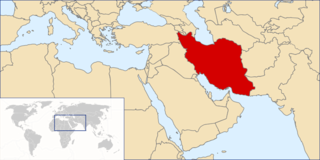 People have been migrating around Central Asia since before the dawn of history (the advance of Writing, if you’re playing along on your copy of Civilization IV at home), which by definition makes it really hard to figure out what was actually going on. Adolph Hitler twisted some poor, imperialist-era translations of ancient Indian texts to concoct his take, which included a series of invasions of Dravidian (Indian) lands by Aryans, coincidentally the ancestors of his own culturally superior race. Though much of this theory are still taught today, this article and others like it point out that there is little evidence from the Vedic manuscripts, linguistics, or the archaeology of the Indus River Valley to corroborate Hitler’s Nordic myth – and that the Sanskrit word “Aryas” means “noble,” not a superior cultural group.
People have been migrating around Central Asia since before the dawn of history (the advance of Writing, if you’re playing along on your copy of Civilization IV at home), which by definition makes it really hard to figure out what was actually going on. Adolph Hitler twisted some poor, imperialist-era translations of ancient Indian texts to concoct his take, which included a series of invasions of Dravidian (Indian) lands by Aryans, coincidentally the ancestors of his own culturally superior race. Though much of this theory are still taught today, this article and others like it point out that there is little evidence from the Vedic manuscripts, linguistics, or the archaeology of the Indus River Valley to corroborate Hitler’s Nordic myth – and that the Sanskrit word “Aryas” means “noble,” not a superior cultural group.
Historiorant: A spokesman for the racist group Aryan Nations had no comment when asked about the common origin of his organization’s name and that of a member state of the Axis of Evil.
Regardless of whether they were early Nordic supermen or proto-Hindu pastoralists, the Aryans didn’t arrive on the scene until the middle of the 2nd millennium BCE, and evidence of settlement in the region we now know as Iran stretches back way further than that. People of different tribal groups and cultures were building houses out of sun-dried bricks, storing their food in pottery, and clearing field for agriculture as much as four thousand years earlier, making Iran literally one of the birthplaces of civilization itself.
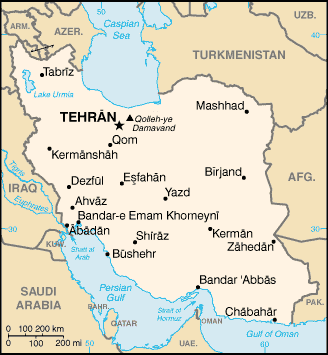 (this map is from the CIA Factbook, and can be found at Wikipedia Commons. More great maps and info can be found behind copyright walls at IranMap.com and WorldAtlas.com)
(this map is from the CIA Factbook, and can be found at Wikipedia Commons. More great maps and info can be found behind copyright walls at IranMap.com and WorldAtlas.com)
The names on the map above, and their ancient equivalents, ring through the ages as crossroads of cultures and centers of science and learning – and as we’ve seen in neighboring (and every bit as ancient) Iraq, failing to recognize the historical aspect of the enemies with whom our Decider picks fights can have disastrous consequences, some of which will cause us to be cursed by future generations:
The looting of the Iraq Museum (Baghdad) is the most severe single blow to cultural heritage in modern history, comparable to the sack of Constantinople, the burning of the library at Alexandria, the Vandal and Mogul invasions, and the ravages of the conquistadors.
-The American Schools of Oriental Research, Apr. 16, 2003, via Middle East Quarterly, Spring 2004
May this legacy inform the President’s decision-making as he ponders the fate of cities like Qom and Isfahan
“Persia,” like so many other classical nouns, comes to us from the Greeks, who used their name for one province in southern Iran – “Fars” or “Pars” – to refer to the entire land. According to Iransaga, the people of this region have always referred to their land as Iran; the foreign-imposed Persian moniker was dropped once and for all in 1949.
Gimme That Ole-Time Federalism
Greek interaction with the Parsii was still three millennia in the future when the first great civilization began to coalesce in Iran, ironically (or fatefully) right atop the great oil reserves of the modern province of Khuzestan. The torch of civilization began to burn in Susiana, the plains around Susa (about 200 km north of the northwestern end of the Persian Gulf), beginning as early as around 4000 BCE, and certainly by 32-3100 BCE. There, the native Elamites got in on the burgeoning movement toward urbanization through trade with the nearby city-states of Sumer, in present-day Iraq, and (presumably) the far-off cultures of the Indus Valley, in modern Pakistan.
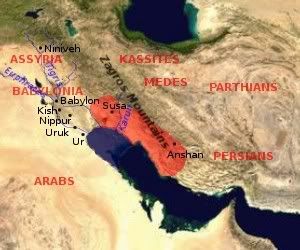
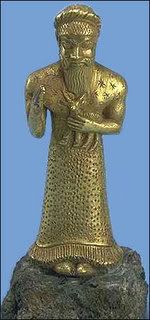 The Elamites developed a federal system of government to administer what was, by ancient Mesopotamian standards, a very large sphere of influence, with colonies extending its influence into the Iranian Plateau and the mountains north and south of Khuzestan proper. From Susa, the Kings of Elam organized trade in natural resources over a dozen or so dynasties and through several distinct ages of growth, decline, and fall – and it seems their solution for how to run a far-flung network of regional industries bears some similarities to our own sovereign-states-under-a-central-authority model. Like the other city-states of the region, those of the Elamites waxed and waned, sometimes exerting power and at other times, having power exerted upon them. As the 3-inch statue at right attests, along the way their artisans developed a unique craftsmanship, the influence of which can be can in the art of the many post-Elamite cultures that called Susa their capital.
The Elamites developed a federal system of government to administer what was, by ancient Mesopotamian standards, a very large sphere of influence, with colonies extending its influence into the Iranian Plateau and the mountains north and south of Khuzestan proper. From Susa, the Kings of Elam organized trade in natural resources over a dozen or so dynasties and through several distinct ages of growth, decline, and fall – and it seems their solution for how to run a far-flung network of regional industries bears some similarities to our own sovereign-states-under-a-central-authority model. Like the other city-states of the region, those of the Elamites waxed and waned, sometimes exerting power and at other times, having power exerted upon them. As the 3-inch statue at right attests, along the way their artisans developed a unique craftsmanship, the influence of which can be can in the art of the many post-Elamite cultures that called Susa their capital.
The first flourishing of the Elamites came to an end around 2334 BCE, when Sargon of Akkad cast his covetous, empire-building eye upon the ziggurats of Sumer. Marching from his capital – Akkad was about 50 km SW of Baghdad, on the left bank of the Euphrates – Sargon quickly subjugated Uruk, Ur, Lagash, and Umma. He then turned his attention to the Elamites, who had formed a coalition under the leadership of king of Awan. It did them little good; the Elamites were crushed, their cities razed, and their kings made vassals of Akkad.
Historiorant: I have to confess to a guilty pleasure here – I love the way the names in Ancient Middle Eastern history roll off the tongue. Fans of 1- and 2-syllable place names can find plenty more in a pair of diaries pico and I did a while back: my bit on the Sumerians, and his Literature for Kossacks: Gilgamesh
War and More War
The Akkadians were brutal masters of empire, but like many such destroy-and-enslave-type conquerors, their reign of terror was relatively short-lived. Sargon’s grandson Naram-Sin, having ascended the throne after both of Sargon’s sons were assassinated, was obligated to lead much of his military to the vicinity of Mount Ararat, there to quell an uprising being led by a guy named Armen. His people were called the Armeni, so if you were ever wondering how that particular region got its name…
Moving his army to the northern reaches of the empire exposed Naram-Sin to attack from the Guti, who emerged from Iran’s Zagros Mountains and sacked Babylon. It was a blow from which Akkad would never recover. In the resulting confusion, the Elamites captured Susa and re-established it as their capital. For the next few hundred years, the peoples of ancient Iran alternately raided and defended against the peoples of ancient Iraq; the history of this period is replete with destroyed cities and slaughtered populations.
Often the reason for war was either the capture or retrieval of artifacts from rival city-states. Shutruk-Nakhkhunte (ca. 1200 BCE) counted among the fruits of his campaigns the statues of Marduk and Manishtushu, the Stela of Naram-Sin, and the Code of Hammurabi. They sat proudly as trophies in Susa for 100 years, but recovery of the Statue of Marduk would eventually be one of the pretexts for invasion by Nebuchadnezzar I of Babylon. Though they did recapture Susa, the Elamites had only one more resurgence left before they went the way of so many other tribes of the Elamo-Dravidian language family; AllEmpires.com makes an interesting observation about this point (ca. 1300-ca. 1100 BCE) in the history of Elam:
It is noteworthy that during the Middle Elamite period, the old system of succession to, and distribution of, power appears to have broken down. Increasingly, son succeeded father, and less is heard of divided authority within a federated system. This probably reflects an effort to increase the central authority at Susa in order to conduct effective military campaigns abroad and to hold Elamite foreign conquests. The old system of regionalism balanced with federalism must have suffered, and the fraternal, sectional strife that so weakened Elam in the Neo-Elamite period may have had its roots in the centrifugal developments of the 13th and 12th centuries.
 At some point in here – scholarly estimates vary widely – the prophet Zoroaster founded what may well be the world’s oldest revealed religion. He is referred to as both a Bactrian (which would place his origin near modern Afghanistan) and a Mede, but what is clear is that he was from Iran. Zoroastrianism is also the first religion to postulate a spiritual battle between good and evil; many of its ideas would find their way into later monotheistic faiths. Evidence of the influence of Zoroastrianism can be seen today in the communities of the Paarsi in India, and in the story of the Three Magi (Zoroastrians all) who visited Jesus, Mary, and Joseph in the manger.
At some point in here – scholarly estimates vary widely – the prophet Zoroaster founded what may well be the world’s oldest revealed religion. He is referred to as both a Bactrian (which would place his origin near modern Afghanistan) and a Mede, but what is clear is that he was from Iran. Zoroastrianism is also the first religion to postulate a spiritual battle between good and evil; many of its ideas would find their way into later monotheistic faiths. Evidence of the influence of Zoroastrianism can be seen today in the communities of the Paarsi in India, and in the story of the Three Magi (Zoroastrians all) who visited Jesus, Mary, and Joseph in the manger.
In the north of Iran, tribes of Indo-European speaking Aryans were migrating from the Caucasus and Central Asia. One group, the Parsa, dispersed in three main regions in the north Iranian Plain and the Bakhtiari Mountains; another, the Medes, established themselves at the site of modern Hamedan, southwest of Teheran, though their influence stretched from Tabriz to Esfahan. A third group, the Scythians, adopted a seminomadic existence based on raiding in the northern Zagros Mountatins, but given what that incurable gossip Herodotus had to say about them, they probably deserve an article of their own…
Noted in antiquity as excellent horsemen in their own right, the Medes were a considerable thorn in the right flank of the Assyrians, who were prosecuting yet another heads-on-poles phase of Fertile Crescent history from their capitol at Nineveh (modern-day Mosul, Iraq). At first, the Medes paid tribute to Nineveh, and their southern neighbors bore the brunt of Assyrian rage – the Neo-Elamites came to a brutal end at the hands of Ashurbinarpal in 647 BCE, as attested by this carving and accompanying script from Wikipedia Commons:
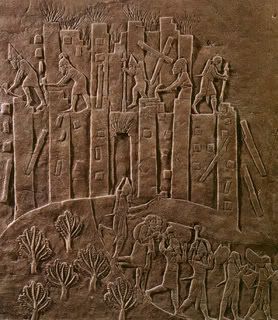
“Susa, the great holy city, abode of their Gods, seat of their mysteries, I conquered. I entered its palaces, I opened their treasuries where silver and gold, goods and wealth were amassed…the treasures of Sumer, Akkad, and Babylon that the ancient kings of Elam had looted and carried away. I destroyed the ziggurat of Susa. I smashed its shining copper horns. I reduced the temples of Elam to naught; their gods and goddesses I scattered to the winds. The tombs of their ancient and recent kings I devastated, I exposed to the sun, and I carried away their bones toward the land of Ashur. I devasteated the provinces of Elam and on their lands I sowed salt.”
That kind of neocon foreign policy didn’t win the Assyrians a great many friends, and in 612 BCE, the Medes led a coalation that broke the Assyrian grip by first capturing Nineveh, then giving the capitol of their hated overlords the Susa treatment. The actions also found the Medes assuming control of an empire that stretched from Afghanistan to Turkey. Among their leaders during this critical period was one Hakamanish, whose name in Greek – Achaemenes – was to make him immortal as the progenitor of the Achaemenid dynasty
Cyrus and Darius: Two Great Guys
In the mid-6th century BCE, a Parsian king (and descendent of Achaemenes) named Cyrus managed to unite the various Persian tribes, and in 549 BCE, he captured the last Median king. Rather executing his vanquished enemy in the Assyrian fashion, Cyrus used the opportunity to unite the kingdoms of the Persians and the Medes under his rule. He then turned his attention outward, and the first target was the powerful kingdom of Lydia – folks so rich they had to invent the idea of coinage – located in modern Turkey.
Historiorant: Those interested in a really detailed look at Cyrus and the Achaemenid army should check out the articles available at IranChamber.com, which unfortunately uses some kind of totalitarian software to keep me from cutting, pasting, and attributing their work (and even the writings of 4th century BCE historioranter Xenophon) here in the Cave.
Though led by the fabulously wealthy Croesus, Lydia was unable to hold back the armies of Cyrus. He went on to conquer the Greek city-states which peppered Asia Minor’s Aegean coast, then secured his northern and eastern borders by expanding his territory and building forts against Central Asian nomads. His reputation as a benevolent conqueror preceded him when he turned westward and set his sights on Babylon; the ancient city put up nary a fight and welcomed him as a liberator. He also earned a couple of Old Testament shout-outs when he ended the Babylonian Captivity of the enslaved Jewish population and allowed 40,000 or so people to return to their homeland. Some even saw Cyrus as an agent of Yaweh:
1 “This is what the LORD says to his anointed,
to Cyrus, whose right hand I take hold of
to subdue nations before him
and to strip kings of their armor,
to open doors before him
so that gates will not be shut:
2 I will go before you
and will level the mountains;
I will break down gates of bronze
and cut through bars of iron.
3 I will give you the treasures of darkness,
riches stored in secret places,
so that you may know that I am the LORD,
the God of Israel, who summons you by name.
…
13 I will raise up Cyrus in my righteousness:
I will make all his ways straight.
He will rebuild my city
and set my exiles free,
but not for a price or reward,
says the LORD Almighty.”
Isaiah 45 (New International Version)
The pace of nations falling to Cyrus now quickened; Syria and Phoenicia were incorporated into his empire, and plans were being made to invade Egypt, by the time Cyrus was killed in battle with the ancestors of the Afghanis in 529 BCE. He left behind a highly organized state, divided into districts ruled over by satraps (governors) and connected by an excellent system of roads, and bequeathed to his dynasty the beautiful new capitol city of Pasargadae, located in Fars. It was said of the safety and efficiency of the lands ruled by the Achaemenids that through a letter could be sent from the Indus River Valley, at eastern edge of the Empire, to the conquered Greek states in the west, and be received within a week. Given the current situation in the region, it is doubtful one could hope for that level of efficiency today.
Cyrus’ son Cambyses (r. 527-522 BCE) added Egypt to the empire, but found his throne seized in his absence by a usurper. He died under mysterious circumstances shortly thereafter, as did the usurper (a priest named Gaumata), so a distant cousin, Darius (r. 522-486 BCE), ascended to the throne. He is still called Darius the Great in Iran, for he fully embraced Cyrus’ dream of a vast and mighty empire. The Library of Congress has an interesting catalogue of just some of the ways in which we still quote the ancient Persians in our everyday speech:
Darius revolutionized the economy by placing it on a silver and gold coinage system. Trade was extensive, and under the Achaemenids there was an efficient infrastructure that facilitated the exchange of commodities among the far reaches of the empire. As a result of this commercial activity, Persian words for typical items of trade became prevalent throughout the Middle East and eventually entered the English language; examples are, bazaar, shawl, sash, turquoise, tiara, orange, lemon, melon, peach, spinach, and asparagus. Trade was one of the empire’s main sources of revenue, along with agriculture and tribute. Other accomplishments of Darius’s reign included codification of the data, a universal legal system upon which much of later Iranian law would be based, and construction of a new capital at Persepolis, where vassal states would offer their yearly tribute at the festival celebrating the spring equinox.
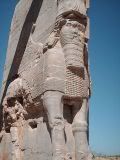 Darius built the elegant city of Persepolis and renewed the vigor of Susa, and though it is true that his actions during the revolt of the Ionian colonies would eventually lead to his defeat at Marathon and his successor Xerxes’ losses at Salamis and Plataea, it should be noted that to the Persians, the wars in Greece were at worst disastrous foreign misadventures; they were not desperate wars of defense like the Greek side was fighting.
Darius built the elegant city of Persepolis and renewed the vigor of Susa, and though it is true that his actions during the revolt of the Ionian colonies would eventually lead to his defeat at Marathon and his successor Xerxes’ losses at Salamis and Plataea, it should be noted that to the Persians, the wars in Greece were at worst disastrous foreign misadventures; they were not desperate wars of defense like the Greek side was fighting.
Historiorant: It should also be noted that, contrary to what 300 would have us believe, neither the ancient Persians nor anyone else ever used rhinoceros cavalry, and Xerxes was definitely not 11 feet tall and androgynous.
Cue the Macedonians
The Persian opportunity to fight for their lives would come a century and a half later, when in 334 BCE Alexander invaded Asia Minor. He defeated the first Persian force sent to greet him at the River Grannicus, then marched across Turkey and stomped the Persians again at Issus, near the modern border with Syria. The Persian king – another Darius – acquitted himself poorly at that fight, fleeing the battlefield when the tide turned against him. Darius returned with the remnants of his army to Persepolis, leaving Alexander free to carve off huge chunks of the western end of the Persian Empire: Syria, Phoenicia, and Egypt all fell to Alexander before he again set his sights eastward.
The Persians deployed their last, greatest army on the Plain of Gaugamela, east of Mosul, Iraq, in 331 BCE. They were again defeated by Alexander, with the Persian king again fleeing in disgrace. Though he pursued Darius for a short time, Alexander wanted to make sure to be the first to loot the treasury of Persepolis, so he marched his army to the Persian capitol. Darius would eventually be killed by his own men seeking to curry favor with their new overlord, but the assassins were bitterly disappointed when Alexander ordered them killed for failing to respect the office of their king.
At some point during the next few months, the royal palace at Persepolis was burned, and there is at least some evidence that this act of defilement was committed under orders from a drunken Alexander, who listened a bit too much to the suggestions that the burning of the Acropolis in 480 BCE ought to be avenged. Regardless, there was little the Persians could do about it, and Alexander soon began to march eastward again, spreading Greek culture and cities named Alexandria (Kandahar, Afghanistan, for example, is a bastardization of Alexandria, and is only one of the 70 or so cities Alexander named after himself) wherever he went. Along the way, he adopted Persian dress and married a Persian wife, much to the consternation of his old-school Macedonian troops, who were even more consternated when Alexander ordered his officers and 10,000 of his men to take Persian brides in a mass wedding at Susa, performed in the name of Alexander’s dream of a united Hellenistic world.
Seleucus & Son
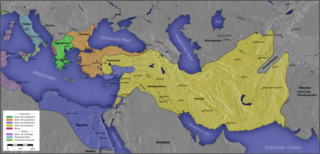
Alexander died in Babylon in 324 BCE, leaving control of his empire to “whoever was strong enough to take it.” The history of the Diadochi (Gr: “successors”) is predictably complicated and bloody – they fought several wars amongst themselves between 322-301 BCE – but in the end, only four men emerged with claim to the lion’s shares of the prize. On the map above, Lysimachus got the orange lands, Cassander won himself the green, and Ptolomey got both the blue territory and Alexander’s claim to the pharaohship of Egypt, establishing a line that would famously end with Cleopatra clasping an asp to her breast 250 years later. In the lands that would eventually become Iran and beyond (depicted in tan on the above map) this meant Seleucus, the former satrap of Babylon, would get a shot at running things.
Sources seem to differ rather widely regarding the rule of the Seleucids, depending – it would appear – on the political bent and national origin of the historian doing the writing (gasp!). Some are glowing:
By 313 BC, Hellenic ideas (disseminated by the conquering Macedonian army’s hired philosophers and historians, retired officers, and married inter-racial couples) had begun their almost 250-year expansion into the Near East, Middle East, and Central Asian cultures. It was the (Seleucid) empire’s governmental framework to rule by establishing hundreds of cities for trade and occupational purposes. Many cities began, or were induced, to adopt Hellenized philosophic thought, religious sentiments, and politics.
Source: Wikipedia
Some are less so:
The Hellenistic period in Iran began in 331 B.C. and continued until c. 250 B.C. This was the time when the Greeks tried to impose their culture on Asia. During approximately a century and a half of Greek rule in Iran, very little construction took place, and ruins from this period remain few and far between.
Source: Iransaga
Important point: “Hellenic” refers to the culture of Greece – “Land of the Hellenes” – itself, while “Hellenistic” means something more akin to “in the style of the Greeks.” Hellenism often melded local artistic traditions with Greek forms to create something quite unique, as the Nike of Samothrace, the Colossus of Rhodes, and the mind-boggling brain of Archimedes of Syracuse clearly show, though the Wikipedia article cited above also leaves this caveat:
“Synthesizing Hellenic with native cultures and intellectual trends met with varying degrees of success — resulting in times of simultaneous peace and rebellion in various parts of the empire.”
Regardless of the level of credit accorded he and his heirs, Seleucus does seem to have tried, at least in part, to live up to Alexander’s vision of a grand Hellenistic Empire. He married a noblewoman of Iranian origin and had a son, Antiochus, by her, thus establishing a dynasty that blended the races of Europe and Asia. His affection for things Asian did not mean that he would actually spend most of his time in Persia, however, and he was cagey enough to not want to place himself too far from the kingdoms of the other generals who had snarfed up Alexander’s realm. Rather than rule from Persepolis or Pasargadae – too far east – he established the cities of Seleucia in Mesopotamia and Antioch (named after his heir, and which went on to play a major role in Early Christianity as well as the First Crusade) in Syria to serve as his capitals. While this move did allow the Seleucids to play a role in the affairs of Egypt, Asia Minor, and eventually northern Greece, it cost them dearly on their eastern flank.
Never Bring a Hoplite to a Gladius Fight…
East of the Zagros, the nomadic Parni people, who were originally native to the area between the Caspian and Aral Seas, had begun to settle in the satrapy of Parthia. Like many nomads, they were fiercely independent; so much so that, following closely on the heels of the secession of the eastern province of Bactria (northern Afghanistan – and we all know how independent-minded those guys are) in 250 BCE, the Parni led a similar Parthian proclamation of independence. Though the rebel provinces were re-conquered by Antiochus III between 209 and 204 BCE, they had tasted freedom from foreign domination, and it proved a difficult desire for the Mediterranean-obsessed Antiochus to suppress.
Antiochus didn’t do himself any favors, either. The ambitious king was not content with fighting to regain what his forefathers had lost; he wanted to expand Seleucid influence at the expense of the descendents of the other Diadochi. Initially he was successful: in a series of Syrian Wars which ended in 200 BCE, he wrested Palestine from the Egypt-ruling heirs of Ptolomy, then marched across Asia Minor and, in 196 BCE, over the Hellespont and into Greece itself. He added Thrace to his conquests in 194 BCE.
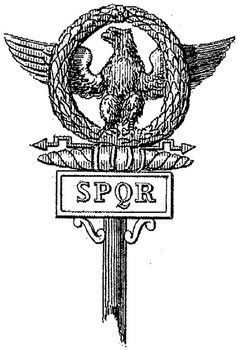 This expansion into Europe put the Seleucids on a collision course with the other rising superpower of the Mediterranean world in the 2nd century BCE, and Rome was all too willing to draw a line in the sand. A Roman army led by Scipio Africanus (he of the defeating-Hannibal-in-the-Second-Punic-War fame) faced off against a much larger Seleucid force commanded by Antiochus himself in 190 BCE, at a place called Magnesia (pronounced Mag-na-see-ah, not the way you’re thinking) near the Aegean coast of Turkey. Hannibal, too, was present on the Seleucid side; since his loss at Zama 12 years prior, he’d basically wandered the Mediterranean, taking advantage of opportunities to kill Romans when they presented themselves.
This expansion into Europe put the Seleucids on a collision course with the other rising superpower of the Mediterranean world in the 2nd century BCE, and Rome was all too willing to draw a line in the sand. A Roman army led by Scipio Africanus (he of the defeating-Hannibal-in-the-Second-Punic-War fame) faced off against a much larger Seleucid force commanded by Antiochus himself in 190 BCE, at a place called Magnesia (pronounced Mag-na-see-ah, not the way you’re thinking) near the Aegean coast of Turkey. Hannibal, too, was present on the Seleucid side; since his loss at Zama 12 years prior, he’d basically wandered the Mediterranean, taking advantage of opportunities to kill Romans when they presented themselves.
Though they brought elephants to the party, and camels, and heavy cavalry, and scythe-chariots, Magnesia turned out to be the death-knell for both the Seleucid Empire and the heavy phalanx upon which Greek-styled armies relied. Using fast-moving legions to counter the cumbersome ranks of nearly unmanuverable spearmen, the Romans saw only 300 infantry and 49 cavalry fall, compared to Seleucid losses of some 50,000 infantry, 3000 cavalry, 15 elephants, a captured and looted camp, and 1400 taken prisoner. Antiochus was forced to sue for peace, made to pay an enormous indemnity, and obliged to turn over control of Asia Minor to Rome. This last stipulation has enormous historical importance, for Asia Minor would eventually become the Eastern Empire, which would then morph into what we know as the Byzantine Empire, which outlasted its mother city’s glory by 1000 years – and all because Antiochus III didn’t know enough about his enemy to show up properly armed.
…Nor Infantry to a Horse Archer Fight
Meanwhile, back east of the Zagros, the Parni took the opportunity to announce the birth of their new Parthian Empire. The Seleucids, now being pursued eastward by the encroaching Romans – always good ones for smelling blood in the water – and with most of their army bleaching in a field north of Ephesus, were unable to do anything about it. They did try, launching invasions on at least three occasions, but with the Maccabees asserting their freedom in the west, Romans pushing toward Mesopotamia, Bactrian hassles in the east, and now the Parthians launching arrows from the north, it is little wonder that the Seleucid king Antiochus VII was forced to plunder his own treasury and use it to hire an enormous mercenary army for a final, pitched battle against the Parthians.
The Parthians had spent the prior winter spreading discontent and rebellion in Seleucid cities in which troops were quartered, and it paid off on the field of battle. Antiochus was killed at Ecbatana in 139 BCE, which gave the Parthians control of all of Iran, ended the Hellenistic period once and for all, and left the Seleucids with an ever-shrinking chunk of Syria. So it was that a dynasty that had sprung from the ashes of Alexander’s empire came to a rather ignoble end in 64 BCE, when the Roman consul Pompey made Syria a Roman province and the heirs of Seleucus were powerless to stop him.
The Parthians would remain a check to Roman expansion for the next three centuries, however, and it was the Roman inability to defeat these master horse archers that defined the eastern borders of the empire throughout the Pax Romana. The Parthians also displayed a wee bit of nationalism: they describe themselves as Hellenophiles on their money, but this should probably be read in the context of being anti-Roman (question: given this, what does “In God We Trust” mean?) and not wanna-be Greek. Starting around 150 BCE with the first Parthian king, Mithridates I, the new royalty sought to establish its descent from the native Achaemenian line of Cyrus the Great, and by the end of Mithridates’ reign in 138 BCE, the Parthians had reassembled the core of the empire of Cyrus by conquering Media, Fars, Babylonia, and Assyria, administering their holdings in much the same way as the Achaemenids, while using a native Pahlavi script to record their deeds.
Parthian expansion and their ability to defend their winnings had long-term effects on Iran and the surrounding regions. The Hellenistic, if independence-prone, kingdom of Greco-Bactria was choked off, leaving only fodder for great Rudyard Kipling stories in its wake. The Parthians won control of the Silk Road, and kept their relationship with the Chinese more or less to themselves. Finally, their nomadic roots, fierce independence, and keen sense of when to give battle allowed them to weather occasional defeats – the most important of several Parthian capitals, Ctesiphon (located on the east bank of the Tigris, downstream from Baghdad), fell to the Romans three times in the 2nd century CE alone – and establish what was to become the most stable empire in classical southwest Asia.
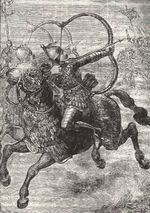 Probably the best example of Parthians taking lemons and making Roman blood came during The Imperial Surge of 53 BCE. While Caesar was off conquesting Gaul, a rival of his, one Marcus Licinius Crassus (he of the defeated-Spartacus-twenty-years-ago-and-ain’t-done-nothin’-since fame), decided that he could bring a little glory unto his august self by slicing off a chunk of Parthia for Rome.
Probably the best example of Parthians taking lemons and making Roman blood came during The Imperial Surge of 53 BCE. While Caesar was off conquesting Gaul, a rival of his, one Marcus Licinius Crassus (he of the defeated-Spartacus-twenty-years-ago-and-ain’t-done-nothin’-since fame), decided that he could bring a little glory unto his august self by slicing off a chunk of Parthia for Rome.
Big mistake. Vastly outnumbered, the Parthians nevertheless used their 9000 horse archers to devastating effect, showering the Roman legions with a constant barrage of missiles. Archers were kept resupplied by camels laden with no cargo but arrows. When the Romans tried to form a protective “tortoise” shield-wall, the Parthians sent in their 1000 cataphracts – heavy cavalry – to beat up on the tight formations. When the Romans sent out skirmishers, the horse archers would feign retreat, fire a “Parthian shot” over their shoulders, then wheel and fire again when they were once again outside the enemy’s range. Crassus himself bought it at Carrhae, as did tens of thousands of legionaries, many pinned to the desert floor by the merciless arrows of the nomads.

A Bad Place to Die
Historiorant:
 Other important events were transpiring in the south, among the old stomping grounds of the Elamites, but those stories are going to have to wait for the next redux in this series. For now, thanks for accompanying me on this trip down the Memory Hole, and once again for two years (actually, I’m a day short of the two-year anniversary of my first diary) of support for some of the more off-topic – (or subversively on-message? heheheh) – diaries that get run up the flagpole for Kossack approval.
Other important events were transpiring in the south, among the old stomping grounds of the Elamites, but those stories are going to have to wait for the next redux in this series. For now, thanks for accompanying me on this trip down the Memory Hole, and once again for two years (actually, I’m a day short of the two-year anniversary of my first diary) of support for some of the more off-topic – (or subversively on-message? heheheh) – diaries that get run up the flagpole for Kossack approval.
Historically hip entrances to the Cave of the Moonbat can be found at Daily Kos, Never In Our Names, Bits of News, Progressive Historians, and DocuDharma.



















